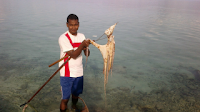Hectors_Dolphin Threats
Threats
The greatest threat is undoubtedly habitat degradation, a worldwide phenomenon affecting a plethora of marine species.
As growing numbers of people move to coastal areas, housing development and commerce cause increased pollution, sewage outflow, and sedimentation in marine waters. All of these factors threaten fragile coastal ecosystems and the marine organisms living in them, including the bottlenose dolphin.
| Recreational boaters sometimes injure dolphins and engine noise can disrupt foraging and communication. Photo courtesy of SDRP. |
But it’s not all doom and gloom: You can do a lot to help protect bottlenose dolphins and other marine species.
- Get involved by volunteering with a research or conservation group in a coastal area or a dolphinarium.
- Organize local beach clean-ups and practice green behavior such as picking up your trash at the end of a day at the beach.
- Do not harass local wildlife: Watch from a distance and let animals behave naturally.
- Teach others how they can help protect their favorite marine mammal, even if you don’t live near the ocean.




Comments
Post a Comment